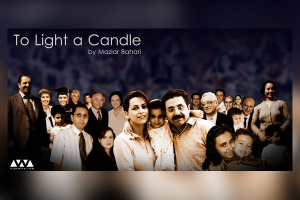Source: blogcritics.org/movie-review-to-light-a-candle-a-bahai-story-of-hope/
by William Lambers

The plight of the Bahai minority in Iran has been featured in my previous interviews with Nava Ghalili and Niknaz Aftahi. Now there is a new documentary film which tells of the resilience and hope of the Bahai faith.
In the following interview, Niknaz Aftahi returns to discuss the film titled To Light a Candle.
For readers new to the subject please tell us something about the Bahai?
Bahai Faith is a world religion with its origin in the 19th century Iran. Teachings such as emancipation of women, abolition of any sorts of violence and religious fanaticism, separation of church and state, appreciation and promotion of religious and ethnic diversity among many others, and abolition of priesthood are among many teachings of the Faith that contradict with the core beliefs of the ruling clerics of Iran. This contradiction coupled with the fear that the spread of the Faith would be a direct challenge to the authorities of ruling clerics have historically motivated them to persecute and annihilate Bahai’s.
What message do you hope to send through this film?
The Bahai Institute for Higher Education (BIHE) is an example of how to respond to persecution in a positive and constructive way without spreading hatred or violence, a perfect embodiment of constructive resilience, a model of education where the whole community is involved in the process of learning and teaching. We hope that this could inspire many Iranians who are suffering tyranny and be a glimpse of hope to them. We hope that the academic world comes to know more about BIHE through this movie, to support the university more by giving BIHE students access to online libraries and resources, and to recognize the BIHE degree and to voice their concerns to the Iranian government and Iranian university over systematic denial of higher education to Iran’s largest non-Muslim minority: the Bahai’s.
What has been the response to the film so far?
To Light a Candle has been screened at a number of locations around the world; these includes several US cities, London, Melbourne, and Kuala Lumpur. Smaller private screenings have also been held in Singapore, Jakarta, Hong Kong, and in other places. The film has been universally met with a profound sense of appreciation – both for the documentary itself, and its invaluable contribution to the coverage on human rights in Iran, and for its unique story of peaceful resistance. People have also, in many cities, lent their support for the “Education is Not a Crime” campaign by recording short video messages to be prominently displayed on the upcoming campaign website.
Where can people view To Light A Candle?
To Light a Candle screenings will continue to be held over the next several months. George Washington University is hosting a screening on 15 November, and there will be a screening at the Carter Centre on 17 November. And next year, on 22 February, the “Education is Not a Crime” campaign will hold a global day of action, which will involve multiple screenings in cities around the world. You can sign up to the mailing list at educationisnotacrime.me.
What are some ways people can learn more about the Bahai in Iran?
iranpresswatch.org publishes the most recent news, articles, and letters that pertain to the persecution of Baha’is in Iran. Most human rights organizations that work exclusively on Iran have news coverage over persecution of Bahai’s,united4iran.org, hra-news.org/en/, iranhumanrights.org are some of them.
Leave a Reply